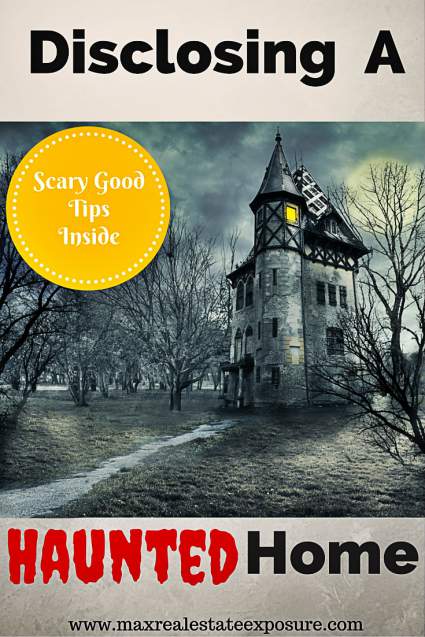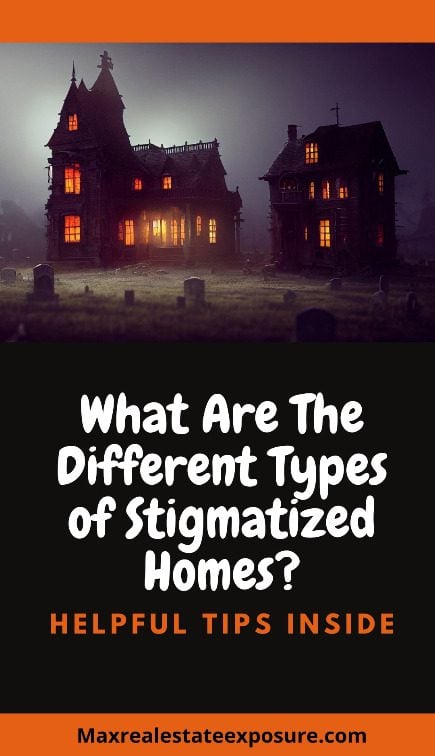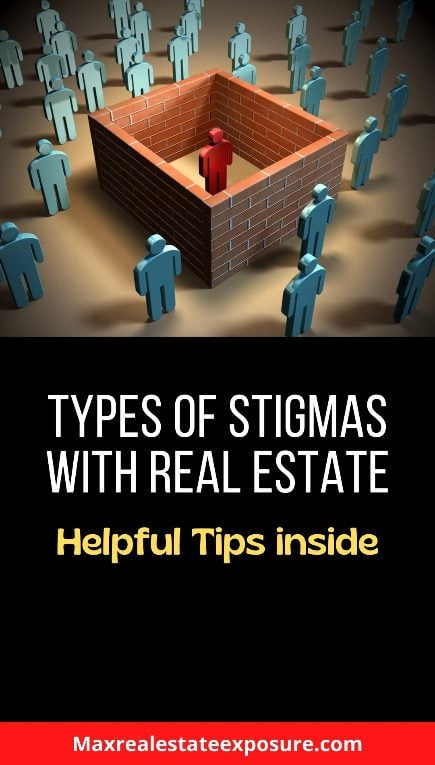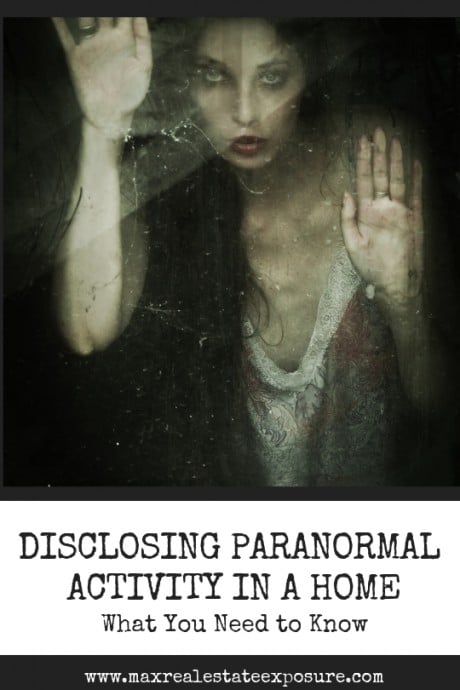Disclosure of Haunted Homes, Paranormal, Ghosts, and Murder
 What is stigmatized property, and do you need to disclose it? Stigmatized properties always bring lively discussions among buyers, sellers, and real estate agents.
What is stigmatized property, and do you need to disclose it? Stigmatized properties always bring lively discussions among buyers, sellers, and real estate agents.
Whenever Halloween rolls around, it is a perfect time to discuss one of the more ghoulish real estate disclosure laws issues.
Do you need to disclose a haunted home, murder, suicide, paranormal activity, stalker, or sex offender in the neighborhood?
Whether you need to disclose a haunted house and other stigmatizations is a question many sellers and real estate agents have asked themselves more than once.
Selling a home can be challenging, even in the best of times. The various obstacles you must overcome to sell a house tend to motivate sellers to put their best foot forward, which is understandable.
Every seller wants to sell – as quickly as possible and for as high a price as the market will bear.
But what happens when you are selling a stigmatized property that carries its baggage – like a home where someone committed suicide, was murdered, or was known to be haunted by paranormal activity?
These houses are often smeared and vilified by the public.
If you are one of the owners of such a house, you must be aware of the laws in your state concerning disclosure.
We will cover everything you need to know about stigmatized properties.
What is a Stigma?
A stigma is something associated with negativity. A less desirable situation often characterizes it.
What is Stigmatization in Real Estate?
The National Association of REALTORS® defines stigmatized property as homes psychologically impacted by an event that occurred or was suspected of having occurred at the property. Such an event has no physical impact of any kind.
However, in real estate, stigmatizations are characteristics or situations in and around a property that can make them less desirable to potential home buyers.
Some stigmas can be worse than others, but overall, they tend to lower property values. There are several types of stigmas in real estate.
Speaking to a local Realtor can help identify the impact of a perceived stigmatization of a home you may be interested in buying.
What Exactly is a Stigmatized Property?
You may be wondering what are considered demonized properties.
Some properties can be discredited for emotional or psychological reasons, such as murder, suicide, and sexual assaults on or near the property.
Properties that are alleged to be haunted or have paranormal activity are also considered to be stigmatized. Such locations can be psychologically impacted, leading some individuals to refuse to live in the residence. The words “speak evil of” often come to mind with these homes.
Tainted homes also lose some of their market value due to negative publicity. Knowing the history of a house could be necessary for many home buyers. All you need is an address to start your research.
Specific Types of Tainted Property
 There are several different types of stigmatized properties. Here is a review of the most common:
There are several different types of stigmatized properties. Here is a review of the most common:
Haunted or Paranormal Property
When reports of paranormal activity arise, investigations typically ensue. However, such phenomena can often be attributed to more mundane explanations, such as a damaged pipe or the presence of an animal.
For those familiar with television shows like “Paranormal Activity” and “Ghost Hunters,” it is easy to understand why some may believe their houses to be haunted.
In recent years, numerous instances of paranormal activity have been caught on camera, leading many to question whether the existence of the supernatural is real. Many believe there are real ghosts in homes.
Those who have seen these videos often express shock and disbelief at what the footage reveals. It begs the question: is the paranormal a reality?
Hauntings and ghost stories are no longer superstitions, especially when an evil entity is ruining your life.
Suicide, Murder, and Death
Today, it is becoming increasingly common for people to die in their homes as opposed to a hospital setting. Those suffering from a terminal illness or old age may opt for a home death as it can be more comfortable and less disruptive for their loved ones.
However, when a home becomes the site of a violent death – such as homicide or suicide – potential buyers may become uneasy, considering the potential downsides of such an event.
Homes can develop a bad reputation, which impacts their present and future value.
When considering a home, potential buyers should know the disclosure requirements specific to the state they seek.
For instance, in Massachusetts, a “caveat emptor” state, sellers and real estate agents are not obligated to disclose any suspected paranormal activity, as well as any deaths or murders that may have taken place at the property.
Ultimately, the buyer must be informed of all conditions associated with a prospective home.
Properties With Crime
Property with a criminal activity stigma is associated with significant crime or illegal activity. A rough past can significantly impact the desirability and saleability of the property.
Potential buyers must understand all possible implications before making any commitments, including potential negative associations and safety concerns.
Properties associated with past criminal activities, like drug dealing and prostitution, may be available at a discounted rate. However, it is crucial to consider the potential risks of buying this type of property beyond its perception by surrounding neighbors.
The ownership transition may come with unexpected challenges as visitors may still be unaware of the change, continuing to use the property for unlawful activities. Furthermore, being in a high-crime area could increase home insurance premiums.
Even debt collectors visiting a house to collect on a past debt can be seen unfavorably.
Sex Offenders Stigma
When purchasing a property, it is essential to know if any sex offenders reside in the vicinity. To ascertain this information, one can contact the local police department to determine if a registered sex offender lives there.
The presence of a sex offender close to a residence or business can lead to potential stigma and should be considered during the purchase process.
Does a sex offender need to be disclosed? Laws can vary from state to state regarding sex offender disclosure. It is essential to find out for many buyers, especially when kids are involved.
Abandoned Homes Stigma
Dangerous, decrepit, and gloomy are perfect ways to describe these houses. Being deserted doesn’t have an appealing feeling.
Recent reports suggest that vacant and abandoned residential properties account for 1.4% of all homes in the United States. This number tends to increase during economic downturns, potentially hurting neighborhood property values.
However, these properties can present an attractive and affordable opportunity for real estate investors.
By purchasing such property, making necessary improvements, and increasing its attractiveness to potential buyers, investors have the potential to impact the neighborhood’s overall value positively.
Some of these abandoned homes have also become condemned properties. They can best be described as grim and inhospitable.
Miscellaneous Types of Stigmas
 Besides the common stigmas mentioned above, numerous other potential things will cast aspersions on a property.
Besides the common stigmas mentioned above, numerous other potential things will cast aspersions on a property.
However, there can be many other more general stigmatizations.
They can be broken down into internal and external property stigmas. Let’s review examples of them.
Significant Structural or Mechanical Defects
Some homes have significant structural or mechanical defects and become denounced. These issues are often found in houses sold as-is where the owner does not intend to fix them.
Skipping Building Permits For Major Renovations
Another common stigmatization can occur when homeowners skip getting permits for significant renovations. The home becomes characterized negatively because potential buyers don’t know if the work was done to code, which could be a safety issue.
Future buyers could also have the same concerns. The automatic assumption among many buyers is the workmanship could be shoddy.
The Presence of Significant Mold
A large amount of mold in a house can cause significant health concerns. Buyers often demand that the mold be remediated or back out of the sale altogether. Selling a house with mold must be taken seriously, or buyer’s agents will see it as a significant stigma.
Underground Oil Tank That Has Leaked
Years ago, it was legal to bury oil tanks in the ground. That is no longer the case. It was discovered that an oil tank could rot over time, creating a significant environmental hazard. A property with an underground oil tank would be a stigma.
Located Adjacent to a Gun Range
A property abutting a gun range can be smeared due to noise and safety issues. Many buyers will have a problem with this specific stigmatization.
Located Adjacent to High Tension Wires
A house next to high-tension wires can be maligned due to the unsightly appearance of the cables. There is also some concern that living next door to some high-tension wires can be unhealthy.
Being Adjacent to Train Tracks
A stigma is associated with abutting train tracks due to noise and safety concerns.
Close Proximity to a Major Highway
Homes located next to a significant highway become discredited if the roadway is visible and there is a large volume of noise. These properties are typically much harder to sell.
Located Next to a City Dump
A few stigmatizations can be located next to a landfill, including the smell and large volume of trucks entering and leaving the property.
Abutting A Strip Club or Brothel
Being near a strip club or brothel would carry stigmatization due to the nature of the business. Some potential buyers may object to being near these activities.
Located Next to a Homeless Shelter
Abutting a homeless shelter may cause some concern with buyers due to the nature of the people living on the property.
Living Next Door to a Hoarder House
A hoarder house is one in which the owner collects an abundance of junk. Sometimes, the hoarding becomes so bad that it spreads to the property’s exterior, creating an eye-soar for the neighbors to look at.
Adjacent to Bad Neighbors
Sometimes, you get stuck living next to bad people in general. A select group of people can become stigmatized if they constantly create problems for everyone around them.
Dealing with a bad neighbor can become a significant problem if many people know about them.
Painting Your House a Ridiculous Color
Some properties stand out the wrong way and become ostracized because of it. For example, painting your house purple will not appeal to many people. You would be creating your stigma.
The Home is Located on a Flood Plain
Properties that are in a flood plain will require flood insurance. Unfortunately, flood insurance is costly. It can add a significant amount of money toward your yearly homeownership expense.
Located in an Undesirable School District
Sometimes, everything about a home can be excellent, except where it is located. If the school system where a property is located is terrible, it can carry stigmatization.
How to Find Out if a Property is Ostracized?
Doing real estate due diligence is essential when buying a house. It would help if you researched and leaned on your real estate agent for assistance.
Disclosure of Besmirched Property Varies From State to State
Stigmatizations may (or may not) be required to be disclosed about your home to buyers before you make a sale.
Therefore, finding out from your Realtor or attorney if revealing haunted homes, paranormal activity, murder, and suicide at your property are necessary becomes paramount!
Getting sued is probably not something most people want to experience. Real Estate agents and homeowners should continually educate themselves on their responsibilities.
Here are the disclosure laws in every state for stigmatized properties. It is worth a look when you’re moving out of state.
What You Need to Disclose With a Blacklisted Property
Depending on the state in which you reside, there are some things a real estate agent may or may not need to disclose. If a Realtor is asked a direct question, they ALWAYS need to answer honestly.
Hiding information from a consumer can easily lead to getting sued. Voluntary providing information, however, is another matter altogether.
Here are some common disclosure issues that real estate agents and homeowners need to be familiar with.
It means understanding whether you are required to disclose these property issues.
- Do I need to disclose a haunted home?
- Is it necessary to disclose paranormal activity?
- Do I need to disclose if a murder took place on a property?
- Does suicide in a home need to be disclosed?
- Do I have to disclose that a sex offender lives next door or close to the home?
- Will be required to let buyers know that death from AIDS or other diseases occurred in the home?
While I am sure every buyer would like to know the answers to these questions, it may not be necessary to give them the information voluntarily.
Stigmatized Property Listings Are Common in Every State
 Bad things happen sometimes, and when they do, you may have no control over them. Murder, suicide, and other misfortunes occur regularly nationwide and worldwide.
Bad things happen sometimes, and when they do, you may have no control over them. Murder, suicide, and other misfortunes occur regularly nationwide and worldwide.
Plenty of these unfortunate events happen in everyday homes. Many buyers need to know how to find out if someone died in a house.
There are also homes that many consider haunted, scattered throughout the country, and well-known by some as locations where paranormal activity occurs.
Wikipedia defines a haunted house as a home or other real estate often inhabited by disembodied spirits of the deceased who may have been former residents or were familiar with the property.
The supernatural activity in homes is often attributed to violent or tragic events in a building’s past, such as murder, accidental death, or suicide.
Properties affected by such events are often referred to as stigmatized.
A blacklisted property can also be a home that has been the scene of well-known crimes, cult activity, or famous adulteries.
Some states still refer to homes where inhabitants had AIDS as tainted, but this is a throwback to when the disease was not as well understood as it is today.
Sometimes, homes become abandoned because of paranormal activity.
Real Estate Agents and Home Sellers Get Sued Because of Non-Disclosure of Stigmatized Properties
In another recent unusual case, a home was being stalked by a person known as the watcher. The couple who purchased the home is suing the former owner because they did not disclose a stalker who has been sending them threatening letters since the day the house closed.
The buyer feels the owner should have made them aware of this nut job before they decided to move forward with their home purchase. It is a compelling case that bears watching – no pun intended!
Some buyers won’t even want to be associated with an area with scandalized properties, never mind a house. From a buyer’s perspective, knowing how to pick a neighborhood is crucial for general happiness and future resale value.
What Are Your Areas Disclosure Requirements?
The traditional legal rules surrounding a home sale were known as caveat emptor or let the buyer beware. This meant sellers were not required to disclose anything about the home they were selling.
But some states have changed this rule, requiring the disclosure of specific information – such as murder, suicide, a haunting, or what’s known as a haunted house.
Remember that caveat emptor does not mean making misrepresentations or lying to buyers. If someone asks a direct question about the property they are interested in buying, you must reply truthfully and avoid any efforts to mislead.
Half-truths can get you into significant trouble should the buyer discover something wrong that you did not disclose after being asked. Communicating haunted homes and murder in real estate sales is not to be taken lightly.
According to local laws, sellers and agents need to know their duty and responsibility for disclosure. Hiding knowledge about a home that should be shared can lead to problems.
Example: Massachusetts vs. California on Stigmatized Houses
 Every state has its version of real estate law, so you must research to verify that you follow all the rules when selling a home.
Every state has its version of real estate law, so you must research to verify that you follow all the rules when selling a home.
For example, we can examine the differences between Massachusetts and California regarding disclosure surrounding bad-mouthed property.
Massachusetts on Stigmatized House Listings
Massachusetts clearly states that you are NOT required to disclose that the property was the site of “…felony, suicide or homicide” or “… that the real property has been the site of an alleged parapsychological or supernatural phenomenon.”
The law states that there will be no penalty for a seller who fails to disclose any of these issues to a buyer before selling the property.
However, you are required to reply truthfully if asked directly. You don’t have to say anything if you are not requested. This is important for those selling for sale by owner to understand.
Provided here is the pertinent excerpt from the Massachusetts General Laws Chapter 93, section 114 that discusses Real Estate disclosure for alleged haunted homes, murder, and suicide:
Scandalized Property Disclosure is Not a Requirement
“The fact or suspicion that real property may be or is psychologically impacted shall not be deemed a material fact required to be disclosed in a real estate transaction.”
Psychologically impacted shall mean an impact being the result of facts or suspicions including, but not limited to, the following:
- (a) that an occupant of real property is now or has been suspected to be infected with the Human Immunodeficiency Virus (HIV) or with Acquired Immune Deficiency Syndrome (AIDS) or any other disease that reasonable medical evidence suggests being highly unlikely to be transmitted through the occupying of a dwelling;
- (b) that the real property was the site of a felony, suicide, or homicide; and
- (c) The real property has been the site of an alleged parapsychological or supernatural phenomenon.
No cause of action shall arise or be maintained against a seller or lessor of real property or a real estate broker or salesman, by statute or at common law, for failure to disclose to a buyer or tenant that the property is or was psychologically impacted.”
If you asked one hundred Massachusetts real estate agents if they were required to disclose a haunted home or a murder on a property, they would get it wrong.
Many agents would incorrectly assume this is something they must do. There is no duty to disclose. Digging for information on the premises must be done by the buyer.
California on Stigmatized Listings
The state of California has different laws concerning this type of property. In California, you must disclose any deaths at the home in the last three years.
The interesting thing about California law is that it only requires disclosure if the event happened recently. However, in the legal case Reed v King, a buyer brought a lawsuit against a seller in California after it was learned that the home had been the site of multiple murders a decade earlier.
The case was successful, with the court determining that the murders affected the home’s value. So even if the law only says three years, in certain circumstances, you could still get into trouble by failing to disclose major adverse events, even if they fall outside the three-year limit.
It cannot be overstated that every Realtor should understand the disclosure laws in their state regarding these kinds of issues. Some home buyers will not consider buying a home if they know a recent death occurred on the property.
Want to see how you can find out? A great site called Died In House will give you the death history of a house. It’s a neat tool for those worried about smeared properties.
A great site called Died In House will tell you if a death occurred in a home—a pretty nifty tool for those who worry about such things.
Making The Sale, Honesty, And Protecting Yourself
 What to disclose when selling a home can be complicated for you and your Realtor. On the one hand, you want to sell your house and get the best possible price.
What to disclose when selling a home can be complicated for you and your Realtor. On the one hand, you want to sell your house and get the best possible price.
On the other hand, you do not want to feel like you are deceiving anyone, and you want to protect yourself from lawsuits after the home has sold.
What you ultimately choose to disclose must be carefully considered by you and your agent.
Know The Laws in Your State on Property Disclosure
The most important criteria for what to disclose should always be the law in your state.
You cannot take the chance of breaking any rules during your sale, so make sure you adhere to all regulations that apply to your situation.
But if the law does not require you to disclose that your home is stigmatized, you will need to think carefully about what buyers need to know and, more importantly, what they are likely to be upset about should they find out about it later.
Realtors working as sellers’ agents must remember that their loyalty lies solely with the seller.
While an agent may need to disclose a haunted home, it is not their place. An agent would be violating their oath as a seller’s representative.
A seller’s agent owes the seller undivided loyalty, confidentiality, obedience to lawful instruction, and accountability. In other words, if the seller asks an agent not to disclose a murder that took place in the home, the agent can’t reveal this information.
If the Realtor is uncomfortable with this, they shouldn’t enter the relationship to sell the house.
Whatever you choose to disclose initially, always be honest if you are asked directly about any problems. Having your Realtor interact with sellers can be helpful here.
An experienced agent can be honest without being off-putting, which can be handy if your property is villainized.
How to Find Vilified Properties For Sale
A search can be a challenge sometimes for this kind of property. When looking for property listings to purchase, you can try doing a Google search. Stigmatized property for sale near me should work well.
If there are any discredited properties for sale, they will likely potentially appear in the search results. You can also ask a local Realtor if any suspected boycotted houses are for sale.
Other Helpful Real Estate Disclosure Articles
- Required real estate disclosure laws – do you know what is expected to be disclosed in your state and what is not? If you are a seller or an agent representing the seller, you better know unless you don’t mind opening yourself up to potential lawsuits.
- What should you disclose when selling a home – there are specific things that need to be revealed when selling real estate and others that are not. Most of the time, disclosure issues are enforced on the state level.
Final Thoughts
Disclosure can be tricky in real estate, but Realtors should always err on the side of caution when making disclosures. If there is any gray area, it is probably best to disclose what you know and don’t know.
Real Estate agents must understand their responsibilities under state laws if a house is stigmatized. Conversely, before making an offer, buyers should do plenty of research. Knowledge is power when it comes to discovering the reputation of a property.
Remember, negative factors such as what we’ve covered can influence the home value.
About the Author: The above Real Estate information on what stigmatized properties are was provided by Bill Gassett, a Nationally recognized leader in his field. Bill has expertise in mortgages, financing, moving, home improvement, and general real estate.
Learn more about Bill Gassett and the publications he has been featured in. Bill can be reached via email at billgassett@remaxexec.com or by phone at 508-625-0191. Bill has helped people move in and out of Metrowest towns for the last 37+ years.
Are you thinking of selling your home? I am passionate about real estate and love sharing my marketing expertise!
I service Real Estate Sales in the following Metrowest MA towns: Ashland, Bellingham, Douglas, Framingham, Franklin, Grafton, Holliston, Hopkinton, Hopedale, Medway, Mendon, Milford, Millbury, Millville, Natick, Northborough, Northbridge, Shrewsbury, Southborough, Sutton, Wayland, Westborough, Whitinsville, Worcester, Upton, and Uxbridge MA.

